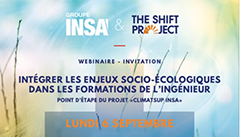
INSA Lyon
Intégrer les enjeux socio-écologiques dans les formations de l'ingénieur
Point d'étape.
Initié en septembre 2020, le projet « ClimatSup INSA » vise à intégrer les enjeux socio-écologiques au cœur de toutes les formations du Groupe INSA. Après un rapport intermédiaire présenté au grand public en février 2021, The Shift Project et le Groupe INSA proposent un nouveau point d’étape afin de présenter l’avancement du projet et les suites à venir.
Additional informations
- https://www.insa-toulouse.fr/fr/webinaire-point-d-etape-du-projet-climat-sup-insa.html
-
Webinaire sur Zoom et retransmission live Facebook
Keywords (tags)
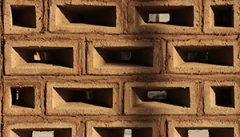
Formation
La difficile équation du matériau de construction durable
Pour construire durablement, faut-il privilégier la pierre, la paille ou la brique comme les trois petits cochons ? Là où « produit de construction écologique » ne rime pas toujours avec « durabilité économique », la transition des matériaux du génie civil se heurte à plusieurs défis. Pour Élodie Prud'homme, enseignante-chercheure au département génie civil et urbanisme et responsable du module « matériaux innovants pour la construction durable » à l’INSA Lyon, il faut commencer par faire connaître et reconnaître les procédés de construction plus durables par les (futurs) professionnels du secteur.
Construction et le développement durable : laisse béton !
Au procès écologique du bâtiment, l’industrie cimentière est habituée à être sur le banc des accusés. En effet, elle représenterait près de 2,9 % des émissions carbone en France. Si le tout-béton a connu son apogée dans les années d’après-guerre, le procédé lourd et énergivore imposé par la fabrication du ciment est désormais pointé du doigt face à la conjoncture environnementale. « De la fabrication du ciment, nécessitant l’extraction de calcaire et d’argile et une transformation gourmande en énergie fossile, en passant par l'utilisation de granulats qui sont des ressources non-renouvelables à l'échelle humaine, le béton est certainement le plus mauvais élève des matériaux. C'est un exemple très parlant pour illustrer l'impact des matériaux dans le cycle de vie des bâtiments. Dans une construction classique, les parties bétonnées entraînent environ 40 % des émissions de CO2 au niveau de l'étape de construction. L’impact carbone est déjà très élevé dès les premières fondations de la construction », explique Élodie Prud'homme.
Parmi les matériaux nouveaux ou redécouverts par les procédés d’écoconstruction : des matières naturelles. Mais si la réponse durable ne doit pas se cantonner à l’utilisation de quelques matériaux biosourcés comme le bois ou la terre, il faut garder à l’esprit que chaque ressource, une fois extraite de son milieu naturel engendre un impact. « La réponse n’est pas automatique. Une réflexion globale est nécessaire », ajoute l’enseignante.
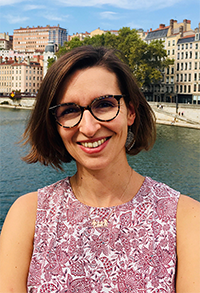 Explorer de nouveaux matériaux : oui, mais pas seulement.
Explorer de nouveaux matériaux : oui, mais pas seulement.
Le premier petit cochon construisit sa maison avec de la paille trouvée dans un champ. Le deuxième trouva du bois dans la forêt et le troisième prit plus de temps pour construire sa maison, car elle était en briques. Ce sur quoi la comptine ne s’attarde pas, c’est la façon dont les trois personnages ont choisi leur matière. Qu’ont-ils préféré ? Des ressources visiblement à portée de main, mais qui n’ont pas toutes résistées au souffle du loup. Voilà peut-être l’un des principaux défis auquel fait face l’écoconstruction du 21e siècle : concilier impact carbone et performance. « Prenons l’exemple de la laine de chanvre dont la production a un faible impact en émission de GES par rapport un isolant de type polystyrène. Si à épaisseur égale, ses performances isolantes ne sont pas aussi satisfaisantes que le polystyrène, est-ce toujours un choix écologique ? En effet, une performance moindre pourra entrainer des consommations énergétiques plus importantes, qui ne seront pas forcément compensées par l'utilisation de l'écomatériau. Il est donc fondamental d'avoir une vision globale de l'impact environnemental du bâtiment pour faire des choix. L’impact écologique d’un bâtiment ne s’arrête pas à la construction, mais se poursuit pendant toute sa durée de vie, à travers son utilisation, et jusqu’à sa fin de vie, sa démolition et la gestion des déchets », souligne l’enseignante.
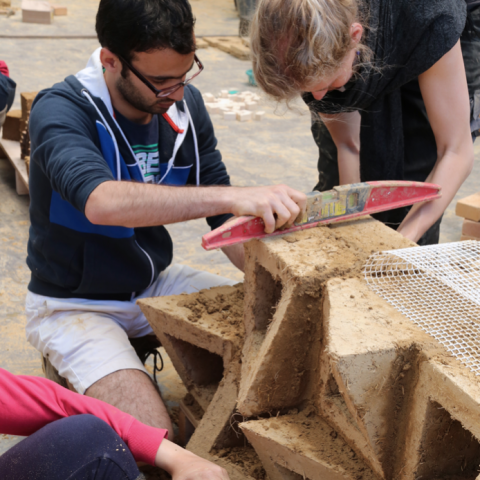 Ouvrir les perspectives des futurs ingénieurs
Ouvrir les perspectives des futurs ingénieurs
Au sein du département génie civil et urbanisme de l’INSA Lyon, Élodie Prud'homme initie ses élèves de 4e année à d’autres regards sur les matériaux de construction à travers un module, intitulé « matériaux innovants pour la construction durable ». Selon elle, la fonction d’ingénieur a un rôle décisif, capable d’accélérer la transition du secteur. « En amont ou sur le chantier, l’ingénieur est souvent amené à faire des choix, bien qu’il doive faire face aux habitudes du secteur qui se résument souvent à trouver l’équilibre entre performance énergétique, coût financier bas, et temps de livraison rapide. Ce qui freine le développement des éco-matériaux aujourd’hui, c’est une certaine méconnaissance de ces solutions alternatives et le manque de cadre règlementaire pour certains matériaux, tels que la terre crue, qui peut encore faire peur, tant aux maîtres d’œuvre, qu’aux investisseurs et assureurs ! ». À travers un programme de découverte, les élèves-ingénieurs suivant le module optionnel déconstruisent leurs préjugés sur les méthodes alternatives. « Les étudiants doivent développer un matériau à base de terre et/ou de fibres végétales répondant à certaines caractéristiques comme être porteur ou isolant. L’expérimentation est indispensable pour découvrir que les ressources biosourcées ont des propriétés inexplorées. Je suis persuadée que c’est en essaimant les petites graines auprès des futures générations d’ingénieurs que le secteur peut évoluer, d’ailleurs, de plus en plus de bureaux d’études émergent sur ces questions de matériaux durables. Cela est très encourageant pour l’évolution d’un génie civil plus durable », conclut Élodie.
Copyright © amàco
Podcasts « Les cœurs audacieux » - Saison 1 / Épisode 2 - 29 avril 2021
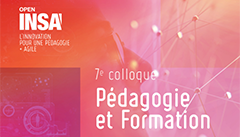
Sciences & Société
7e colloque pédagogie et formation
Tous les deux ans, cet événement constitue un lieu privilégié d’échanges entre les enseignants, les enseignants-chercheurs, et tous les acteurs ayant trait à la formation de nos ingénieurs, architectes et paysagistes.
Continuellement au sein de chacun des établissements du Groupe INSA, des expérimentations pédagogiques sont conduites, les formations sont adaptées pour répondre aux évolutions tant des profils des étudiants recrutés que des besoins de nos diplômés, de nouveaux dispositifs d’accompagnement des élèves et d’évaluation des formations sont mis en place. Cette rencontre permet ainsi de partager, valoriser et mutualiser ces expériences, afin d’enrichir et de faire évoluer nos pratiques et nos formations.
Trois thématiques :
- L’évolution des formations
L’internationalisation des formations, le modèle INSA, spécificités des formations par apprentissage, approches par compétences / programme, évaluation des formations et processus qualité, développement des compétences transversales, projet ClimatSup, intelligence collective et organisation apprenante... - Les méthodes et approches pédagogiques
Retours d’expériences et perspectives : pédagogie par projet, apprentissage par problèmes, développement des dynamiques motivationnelles, pédagogie inversée, interdisciplinarité, technologies immersives... - L’étudiant au centre de la formation
Développement du travail en autonomie, projet personnel et professionnel, dispositifs d’accompagnement pour la réussite, personnalisation des parcours, portofolio, l’IA au service des étudiants ....
Additional informations
- colloqinsa2021@sciencesconf.org
- https://colloqinsa2021.sciencesconf.org/
-
Le colloque se déroulera à distance.
Keywords (tags)
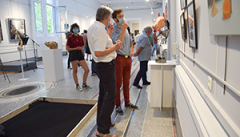
Vie de campus
L'image de la quinzaine
L’art insalien s’expose à Lyon. Peintures, photographies et sculptures des élèves-ingénieurs de la section arts-plastiques études sont exposées au prestigieux Palais Bondy, dans le cadre du salon Regain Art’Lyon. Ils avaient remporté le tremplin Regain qui encourage la création artistique de jeunes talents plasticiens, et l’échange entre les arts et le monde universitaire. La soirée de vernissage a été l’occasion de présenter LUXIE44, une machine inspirée par Léonard de Vinci et Pierre Soulages dont le projet d’exposition au Japon avait été éconduit en raison de la crise sanitaire. Une jolie contrepartie pour les étudiants-artistes d’exporter leurs arts au delà des frontières du campus. À voir jusqu’au 27 septembre 2020.
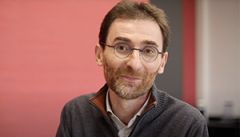
Formation
Educating all students in climate-energy issues: INSA Group opens a partnership with The Shift Project NGO
The Shift Project, a think tank recognised for its expertise on climate-energy issues, and that works in favour of a ‘post-carbon’ economy, will support INSA Group institutions in their project to educate all their students on these issues. Interview with Nicolas Freud, spokesman for the ClimatSup project and pilot of the education development project at INSA Lyon.
What can you tell us about the INSA ClimatSup project, and what will it bring to INSA Lyon education?
INSA Lyon has been in regular contact with The Shift Project since the latter began its work on higher education (see, in particular, the report ‘Mobilising higher education for climate’, published in March 2019). We could see that we shared the view that all students should be educated on climate-energy issues. We then thought that The Shift Project could help us to conduct our education development project on these topics by providing us with methodological support and expertise on a scientific and technical level. It is this that gave rise to the Climatsup project, now in operation at the INSA Group level, which should help us to develop a coherent education programme on the climate-energy topic, within the more global framework of the education development project outlined by the institution's Board of Directors.
Isn't there a risk in associating with The Shift Project, whose proposals can sometimes appear controversial?
The Shift Project bases its proposals on the diagnosis of the scientific community, which clearly establishes the need to decarbonise human activities in order to limit global warming. It is always guided in its approach by the demand for scientific rigour. It is quite legitimate, however, that its proposals should provoke debate, as the problems to be solved to tackle climate change and achieve energy transition are challenging our habits in all areas. INSA Lyon believes that all its students must be educated on these issues, and must be actors in current and future transformations. Even though these are extremely complex subjects, the engineers we educate can and must contribute to informing debates and decision-making, in particular by providing their scientific and technical expertise (which is essential, for example, so as not to get the order of magnitude wrong when looking for solutions). The experience with The Shift Project will be very interesting to help us move forward on these issues.
INSA Lyon is a driving force for the development of its education, in line with key societal and environmental issues. Is this a strategic priority for the institution?
Yes, absolutely. INSA Lyon has recognised the fact that key societal and environmental issues must play a central role in education. Now that the education policy stage has been completed (with the Board of Directors voting on two framework notes in 2019-20), the school is now entering the more operational phase of building future education models, which will be offered to new students from the start of the 2021 academic year. It is a complex project, but we are happy to be, among the Grandes Ecoles, one of the most involved actors in this transformation, which has become particularly urgent.
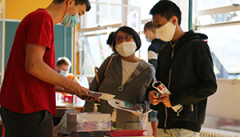
INSA Lyon
L'image de la quinzaine
Rentrée masquée, rentrée quand même.
La Covid-19 n’aura pas empêché la rentrée des étudiants de première année à l’INSA Lyon. Durant deux jours, l'école a accueilli près de 700 nouveaux étudiants, dans le respect des règles sanitaires. Chaque primo-entrant a ensuite rejoint sa « famille », soigneusement choisie par les équipes étudiantes du comité de parrainage. Malgré les masques, curiosité et enthousiasme se lisaient dans les yeux des élèves-ingénieurs, heureux de découvrir leur campus.
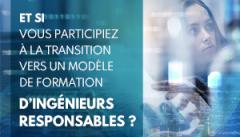
INSA Lyon
Pour faire évoluer sa formation d’ingénieurs, l’INSA sollicite sa communauté
En impulsant un travail de recherche sur la question de l’ingénieur humaniste, l’association des Alumni INSA Lyon fédère l’écosystème INSA autour d’elle et sollicite son réseau de diplômés, à travers une opération de crowdfunding inédite.
Trois questions à Daniel-Louis André, président des Alumni INSA Lyon.
Pourquoi avoir décidé de solliciter la communauté INSA ?
L’INSA Lyon, dans le cadre de la démarche prospective qu’elle a engagée il y plusieurs mois, travaille sur un projet d’évolution de la formation. Avec la chaire, nous nous inscrivons directement dans ce projet et engageons un travail de réflexion de longue haleine sur la question de l’ingénieur humaniste et de son rôle en devenir. Ce questionnement autour de l’humanisme est légitime pour l’INSA, parce qu’il est dans la genèse même de la création de l’école. Gaston Berger et Jean Capelle ont imaginé l’ingénieur comme un homme ou une femme aux compétences scientifiques et technologiques de pointe, avec un sens certain de la responsabilité et de la citoyenneté. Cette vision est toujours d’actualité, mais le monde a évolué. Quel sera le rôle de l’ingénieur de demain ?
La chaire est un creuset de recherche au sein duquel la communauté INSA et les diplômés vont pouvoir s’exprimer et contribuer à construire le monde de demain.
Qu’attendez-vous des ingénieurs INSA ?
L’objectif de la chaire est de recueillir les expériences concrètes des alumni INSA pour alimenter le travail de recherche. Il s’agit de créer en quelque sorte un observatoire des pratiques, avis et idées sur la question du rôle de l’ingénieur humaniste, et nous attendons avant tout du répondant. À travers son réseau d’alumni, la communauté INSA représente une force d’analyse et de réflexion dont la chaire a besoin.
Par ailleurs, grâce aux soutiens qui nous ont déjà permis d’obtenir 65% des fonds, vont pouvoir être établis une étude historico-critique des racines intellectuelles de l'humanisme technologique, un référentiel d'expériences et de bonnes pratiques des diplômés, ou encore une charte éthique définissant les « bonnes pratiques » de l’ingénieur INSA. L’ensemble apportant une matière précieuse pour le projet d’évolution de la formation piloté par l’école.
Pour que cette chaire fonctionne dans la durée, une organisation sur trois ans a été définie avec le recrutement d’un chef de projet. Un soutien financier est de fait nécessaire pour pérenniser ces travaux de recherche.
Grâce aux dons, nous espérons que ce projet, essentiel pour l’école à mon sens, pourra fonctionner dans des conditions satisfaisantes.
Comment pourra-t-on observer l’évolution de la chaire ?
Nous allons proposer aux donateurs une communication dédiée, les « cahiers de la
chaire », qui diffuseront les actualités et les résultats des recherches menées. Par ailleurs, nous allons participer à la conception d’un module de formation continue, autour de la thématique de la responsabilité sociale de l'ingénieur et des entreprises, module qui pourra être proposé aux diplômés.
Nous souhaitons solliciter également la communauté au travers de rendez-vous annuels, tables rondes et colloques. Ce travail de chaire est d’ailleurs un formidable moyen de renforcer le lien entre les alumni et l’INSA Lyon, grâce au sentiment d'appartenance, et de faire rayonner notre école au-delà de ses murs. Nous réfléchissons à ce propos à des actions de communication à destination du grand public, comme des conférences de sensibilisation aux enjeux contemporains de la technologie et de la fonction d’ingénieur.
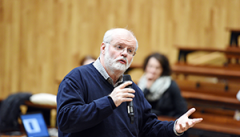
INSA Lyon
INSA engineer, philosopher in action
The role of engineers and their future are at the heart of a process of reflection being undertaken at INSA Lyon with its entire ecosystem. Scientific Co-Director of the Chair ‘Ingénieur.e INSA, philosophe en action. Penser et agir de manière responsable (Thinking and acting responsibly)’, Michel Faucheux, former director of the Humanities Centre at INSA Lyon, a man of letters, sheds light on the context in which this research work is emerging, useful for engineers and the world of tomorrow.
The creation of the chair ‘Ingénieur.e INSA, philosophe en action. Penser et agir de manière responsable’ is in line with the legacy of the philosopher Gaston Berger, one of the founders of INSA Lyon. Although the educational project of training an engineer1 in direct contact with society and its technological, social and economic issues remains relevant, the fact remains that times have changed and we are no longer in the ‘Trente Glorieuses’.
The Chair aims to update and rethink the INSA engineering model while remaining faithful to a heritage that gives our school a strong historical, philosophical and educational identity, which is what makes it unique in the field of French engineering schools. In a conference speech on 8 March, 1955, Gaston Berger described company directors as ‘philosophers in action’, ‘having become aware not only of the complexity of problems, but also of the duties that are imposed on them and that give them an ethical role’. More than ever, to meet the unprecedented challenges facing us, engineers, engaged in technical ‘businesses’ and often company directors themselves, must assume the role of ‘philosophers in action’, guided by a love of a combination of (technical) knowledge and wisdom to guide their actions and make them capable of rebuilding a more humane world.
For the task before us is a huge one, quite different from that of engineers educated in the 1960s, the driving force behind economic growth and well-being that benefited a France shaken and impoverished by the war years.
Two decades ago, we entered a new world produced by an accelerated and radical technological revolution, which some call ‘disruption’. This artificial, digitised, interconnected, virtualised, globalised, multicultural world is shaking up the relationship of human beings with themselves as well as with society, nature and other living beings. The old oppositions that anchored us in a stable relationship with the world have been shattered: true and the false, real and virtual/artificial, man and machine, me and others, here and elsewhere, inside and outside... While our opportunities for action have increased tenfold.
If ‘the world before’ was stable, solid, based on a foundation of guaranteed practices, certainties and representations, this new world where one can surf for all kinds of knowledge and where information circulates at full speed is a ‘fluid’ world, fluctuating, tempestuous, characterised by turmoil, disorder, crisis and the unexpected.
This is what we are currently experiencing: a pandemic that has immobilised a large part of the planet and is linked to a major ecological crisis which, caused by the accelerated destruction of species and global warming, is endangering humanity. The phenomenon of crisis is no longer occasional. It has become structural, the constituent element of our world, taking on several interrelated dimensions: ecological, social, societal, economic and political.
In this new context, the aim of the Chair is to help educate engineers, ‘philosophers in action’, who are not only able to deal with crises and storms but creative and ingenious, cutting across different areas of knowledge to think about technology at a time when the knowledge map is changing. This will also lead us to our destination: a diverse, viable and sustainable world order that engineers will have helped to build. This is not a mere utopia, for there is an urgent need to move towards an economic and social system that recognises the finiteness of the earth's resources and puts technology, freed from the dreams of all power and unlimited profit, at the service of humanity, building a new alliance between human beings and nature but also solidarity between human beings, cultures and societies. Finally, it integrates aesthetic concerns into everyday life.
There has never been such a challenge in the history of mankind because, for the first time, we are talking about the survival of our species and the viability of human constructions. At the end of this long period of lockdown, ‘the time has come’, as many now say, to rebuild a future. There have been builders of monuments of all kinds and major political and social projects... There is now a need for builders of the future. And we believe that ‘the INSA engineer, philosopher in action’, to be faithful to his or her history, must be one of those builders of the future, made up of a mix of technology and wisdom, built on resistance to injustice, inequality and the unacceptable.
But the future cannot be built without the experience of those already engaged in action. This is why the Chair, which is open to the INSA community from which it emanates, thanks to a co-construction approach, will draw on the practical experience of alumni to analyse how we can deploy a responsible mode of action in the company and society, and develop everyday ethics and ‘wisdom’ of action beneficial to all. It will be based on the strength of testimony, feedback and analysis of debates generated by, for example, decision, action and implementation.
The only great projects are those driven by a shared memory and vision. But there are also moments when the storm that sweeps away history can metamorphose into a breath of fresh air towards the future. Caught between a major technological revolution and a radical ecological crisis, we are living at a time that requires us not to look away from ‘our burning house’ but to resist and fight the destructive approaches that threaten the construction of a sustainable world.
We should not be afraid of ambitious projects. The creation of the INSA alternative model was itself an ambitious project. This is why, in the end, I wonder if the project of this Chair is limited to supporting the education of an ‘engineer, philosopher in action’, a bearer of humanist and responsible values - which is already a lot! Perhaps it is much more than that: to help, at the beginning of the 21st century, with the reinvention of humanism, of which INSA engineers should be among the initiators.
In the 16th century, aided by the technical invention of printing, poets, philosophers and scholars returning to the texts of Greek and Latin Antiquity invented a ‘Humanism’ that presided over the period later described as the ‘Renaissance’. INSA engineers, who have become ‘philosophers in action', combining knowledge, thinking about technology to better work with ‘wisdom’ and defining, in an artificial universe, an ideal of human behaviour, could contribute to the reinvention of a humanism that has become our horizon and our necessity. Do we even need to add that there are places conducive to such reinvention and that in the 16th century, Lyon was one of the great centres of Humanism?
Gaston Berger, in the conference speech already quoted, noted that company directors, ‘philosophers in action’, ‘do not simply shape objects’, but ‘build the destiny of men’. In exactly this way, I believe that the INSA engineer of today and tomorrow, the ‘philosopher in action’, must play the role not only of offering a destiny to ‘men’ but of working to ensure that they continue to have one.
The task is difficult and exhilarating, but if the Chair ‘Ingéieur.e INSA, philosophe en action. Penser et agir de manière responsable’, in its rightful place, can help, then it will have found its greatest purpose.
The scientific committee of the chair
It is made up of members from the Gaston Berger Centre, the Humanities Centre and the INSA Lyon Alumni Association.
▪️ Francesca Rebasti, Research Fellow, Coordinator and Scientific Co-Director of the Chair. A Doctor of Philosophy, she specialises in the history of moral and political doctrines.
▪️ Michel Faucheux, Scientific Co-Director of the Chair. A Doctor of Letters, historian of ideas, lecturer, researcher and writer, he co-directed a doctoral thesis on the role accorded by Gaston Berger to the humanities in the education of engineers.
▪️ Marie-Pierre Escudié, Scientific Co-Director of the Chair, is a lecturer and researcher at the Humanities Centre and the Gaston Berger Centre at INSA Lyon, and works on the topic of the social responsibility of engineers.
▪️ Patrice Heyde, Vice-President of the INSA Lyon Alumni Association, Co-Facilitator of the Chair.
▪️ Sonia Béchet, Deputy Director of the Gaston Berger Centre at INSA Lyon, has a doctorate in cognitive psychology.
▪️ Carole Plossu, Director of the Gaston Berger Centre since its creation in September 2015.
▪️ Nicolas Freud, Director of the Humanities Centre, in charge of steering the INSA Lyon education development project.
▪️ Carine Goutaland, Deputy Director of the Humanities Centre, in charge of humanities and social sciences.
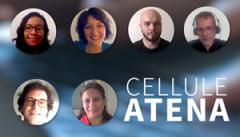
Formation
Continuité pédagogique : les profs accompagnés dans leurs missions à l’INSA Lyon
Comment assurer la continuité pédagogique ? C’est l’une des premières questions qui s’est imposée lors de l’annonce du confinement, il y a deux mois et demi de cela. À l’INSA, campus de 6000 étudiants, ce sont 750 enseignants qui ont dû revoir leurs copies pour continuer d’assurer leurs cours, à distance, et malgré des techniques, pour certains, peu usuelles. Ils ont pu bénéficier de l’aide de toute une équipe dédiée à leurs problématiques : l’équipe ATENA.
« Comment réussir à donner des cours face à un écran ? Comment maintenir la motivation des élèves ? Comment gérer sa charge de travail personnelle ? Voilà quelques exemples de problématiques qui se sont présentées aux enseignants depuis le confinement », explique Fatma Saïd Touhami, conseillère pédagogique de l’équipe ATENA à l’INSA Lyon. Sur le pont depuis l’annonce du 15 mars dernier, la jeune femme a su prêter une oreille attentive à ses interlocuteurs, parfois pour de menus détails, parfois pour des questions plus fondamentales, dans un contexte de crise.
« Pour les aider, nous avons par exemple rapidement mis en place un atelier virtuel, le « rendez-vous des profs », qui leur a d’abord permis de partager leurs difficultés. Pour mes collègues et moi, c’est aussi à travers ces échanges que nous avons pu identifier les besoins des enseignants et leur apporter des solutions adaptées et spécifiques », précise Fatma.
Nouveau rythme, nouveaux espaces de travail collaboratifs, nouvelle façon d’enseigner… En quelques jours, il a fallu s’adapter. « En collaboration avec nos collègues d’OpenINSA, nous avons essayé de nombreux outils pour voir lesquels correspondraient le plus aux besoins des enseignants et des étudiants. Il a fallu les lister, tester leurs fonctionnalités, faire un bilan des points positifs et négatifs, monter nous-mêmes en compétences sur ces outils et ensuite former les utilisateurs. Assez rapidement, on a décidé de ne pas multiplier les outils pour n’en proposer aux enseignants que quelques-uns, efficaces, robustes et qui fonctionnent bien », se rappelle Clément Merle, ingénieur audiovisuel de l’équipe ATENA.
Les membres de l’équipe ATENA saluent la réactivité et le professionnalisme des enseignants de l’établissement qui ont su s’adapter en un temps record à de nouvelles pratiques et de nouveaux outils. « Avant le confinement, 160 enseignants utilisaient le médiacenter pour déposer leurs supports vidéo. Depuis, le nombre de vidéos a doublé et ce sont dorénavant 530 enseignants qui utilisent cette nouvelle plate-forme. Ils ont su réaliser des supports de qualité en utilisant toutes les fonctionnalités mises à leur disposition », explique Pascal Mirallès, responsable du pôle audiovisuel de l’équipe ATENA.
La problématique qui anime actuellement les équipes est celle de l’évaluation des étudiants à distance. « La plate-forme pédagogique Moodle est un outil essentiel pour répondre à cet objectif d’évaluation à distance. Nous avons présenté aux enseignants différentes modalités (tests QCM, oraux, dépôt de devoirs…) et ils ont pu choisir le format le plus adapté à leurs objectifs », expliquent Monica Davila et Alexis Robinet, ingénieurs pédagogiques à l’équipe ATENA, qui ont proposé aux enseignants des sessions de formation en visioconférence visant à leur faire découvrir ces différents modules d'évaluation proposés sur la plate-forme.
Côté étudiant, il a aussi fallu s’adapter, et s’y retrouver. Élève de première année, Adrien Desproges a testé pour la première fois le suivi des cours à distance. « Mes professeurs ont tous mis en place des outils différents pour répondre au mieux au besoin de leur matière. Certains outils étaient parfaitement adaptés à l'enseignement proposé, d'autres...plus compliqués », avoue le jeune homme, qui s’est retrouvé parfois en difficultés devant la pluralité des solutions utilisées. « L’efficacité du travail à distance s'est vraiment ressentie lorsque l'enseignement s'est adapté à la situation. Des séances bien planifiées, dont le contenu et le travail à fournir étaient clairement expliqués sont plus faciles à suivre », souligne Adrien, qui a pu constater que la solidarité avec ses camarades de promotion s’était renforcée face aux contraintes de cette période de confinement. « En travaux dirigés, nous manquons vite de repères sans interaction forte entre humains. La mise en place de système de "salles de conférences privées" sur Zoom pour travailler en groupe a été un grand plus. Le professeur peut même "circuler" parmi les groupes si nous avons des questions. Nous avons pu continuer de nous entraider avec mes amis, encore plus que d'habitude », indique-t-il.
Après le flou des premiers jours, ces méthodes d’enseignement ont été adoptées et maintenues pour durer, puisque le retour des élèves ne se fera pas avant septembre. L’utilisation de nouveaux outils, en état d’urgence, aura permis de tester l’efficacité des solutions, et de les « crash tester » grandeur nature. Mais même si la continuité pédagogique aura été permise grâce à ces propositions numériques, la question de l’intérêt du présentiel demeure.
« S'il est encore trop tôt pour faire un retour d'expérience global sur l'enseignement distanciel généralisé, j'ai pu échanger avec de nombreux et de nombreuses collègues qui ont vécu la continuité pédagogique de manière très diverse, et je pense que nous pourrons tirer des leçons de la multiplicité même de ces expériences », souligne Carine Goutaland, enseignante de sciences humaines et sociales et directrice adjointe du Centre des Humanités de l’INSA Lyon.
« L'enseignement à distance ne saurait se résumer à une transposition systématique du face à face pédagogique via des outils numériques. Pour nombre d'entre nous, enseignants, cette expérience, inédite par sa soudaineté et son ampleur, a aussi été l'occasion de repenser l'organisation et la temporalité de nos séquences pédagogiques, en essayant de donner plus de temps aux étudiants pour faire des recherches, s'approprier des contenus, réfléchir par eux-mêmes... C'est une réflexion que nous souhaitons poursuivre dans les mois qui viennent aux Humanités, notamment avec Thomas Le Guennic, notre référent pédagogique auprès d'ATENA, et Monica Davila, ingénieure pédagogique au sein de l’équipe ATENA et enseignante d’espagnol au Centre des Humanités, qui nous a apporté une aide précieuse dès le début du confinement en proposant un accompagnement personnalisé aux équipes enseignantes », ajoute Carine.
Dans cette crise sanitaire, le plan de continuité pédagogique de l’INSA Lyon n’aurait pas pu être mené sans l’aide de l’équipe ATENA. Forte de cette expérience, elle est déjà tournée vers le futur, prête à accompagner les enseignants pour la préparation de la prochaine rentrée mais aussi dans le vaste chantier d’évolution de la formation qu’a ouvert l’INSA Lyon. « Je suis fière de la mobilisation de mon équipe durant ces dernières semaines. Celle-ci a permis de rendre notre travail plus visible auprès des enseignants de l’établissement. Ils savent tous désormais qu’ils peuvent compter sur l’équipe ATENA pour les accompagner dans l’évolution de leurs pratiques et pour proposer une formation toujours plus adaptée aux défis que devront relever les ingénieur.e.s de demain », conclut Laurence Dupont, responsable de l’équipe ATENA.
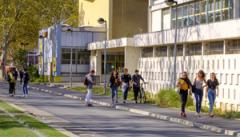
Formation
‘Uniting our efforts in the service of a common ambition for the institution’
The INSA community is rallying round to implement this project affecting all education departments. Meeting with frontline players.
New modes of organisation, production and economic models must be invented
Alexis Méténier, Director of Corporate Relations
‘The need to develop engineering education in relation to the ever-increasing impact of technology on society and the environment is a vision shared by all. Companies of all sizes see engineers as having a major role to play in transitions at work, whether energy, digital, social or economic. Science, which opened the doors to progress, will also have to help find the keys to these great challenges. Many business leaders and engineers are faced with the same questions about the future and share the belief that new modes of organisation, production and economic models must be invented. Given the scale of the task, no one has the solution and all players are affected. It makes sense for INSA to take up these challenges by developing its education without waiting for demand from the job market. It doesn’t just make sense - it’s imperative. The question is no longer which engineer can adapt to progress, but what progress will have to be invented by the engineer’.
Uniting our efforts in the service of a common ambition for the institution
Nicolas Freud, ‘Education development’ project manager
‘Now that the roadmap has been set, it's time to move on to implementation, and Christian Olagnon, Director of Education at INSA Lyon, has asked me to coordinate the project. Having first taken part in the discussions that led to the guidelines set by the Board of Directors (BoD), and being convinced of their importance, I did not hesitate much before accepting the role of project manager, with enthusiasm but also a little apprehension faced with the scale of the task.
The first concrete action is to set up a steering and coordination committee, as provided for in the second framework note voted for by the Board of Directors. The role of this committee will be to ensure the implementation of the project and its consistency throughout the school over the five years of the programme. To this end, it will have to work with all the departments and centres and support teaching staff to develop education models in line with the learning objectives.
The challenge will be to bring on board a large number of colleagues, from all disciplines, and to unite our efforts in the service of a common ambition for the institution. We rarely have the opportunity to work in this way, and on this scale. The deadline of the 2021 academic year for the first and third years will be tight, but we must look to the longer term: these are developments that will be implemented gradually over several years. Even if everything is not perfect right away, what matters is the direction taken. It will probably be difficult, but I am convinced that the challenge is worth the effort’.
We need to give more meaning to our education
Marc Romagné, a fourth-year engineering student in the Civil Engineering and Urban Planning Department, is an elected member of the Departmental Council, the Studies Council and his department's transition group
‘Students want to do science, but not disconnected from the life we live in, including the societal and environmental problems we collectively face. Addressing sustainable development and social responsibility (SD&SR) issues during our education does not mean much if we confine ourselves to raising awareness - we need courses with more systemic approaches, professors who lead us to look beyond their discipline. What is expected of an engineer today? Not the same as 60 years ago. We expect more responsibility, a better consideration of human beings, of discernment in the face of the issues. For example, it is very important to think about the digital world. It does not always have a positive impact - it can also lead to excessive consumption of resources if engineers do not take into account restraint. Furthermore, the societal consequences of digital technology, in terms of usage, must be the subject of more critical reflection. Digital technology has become an indispensable tool, but it is not an end in itself. It is very important to prepare for the changes that are going to happen, to be educated for this. And from this point of view, although everyone agrees that education needs to adapt, the hardest thing is resistance to change’.
Gradually leading students to develop a systemic understanding of the issues
Marion Fregonese, Professor of Chemistry and Thermodynamics in the Basic Engineering Education Department (FIMI)
‘Some existing courses already address SD&SR issues. Such experiences are valuable and will provide a basis for building a more ambitious education. The second framework note voted for by the Board of Directors thus provides for the creation of cross-disciplinary courses dedicated to SD&SR, which will be linked to SD&SR learning introduced into existing disciplines, in order to respond to the technical and societal issues raised by climate change, energy, raw material resources, damage to living organisms (ecosystems) and health, etc., while exploring the links between science, technology and society and the dynamics of change. One of the major challenges will be to lead students to gradually develop a systemic understanding of these issues, from the first year of their engineering curriculum, and this understanding must be built on a solid scientific basis. This will require a transdisciplinary approach, with lecturers from different disciplinary fields working together (in engineering sciences but also in humanities and social sciences). This is an important challenge because, to date, few spaces in the education models allow for it’.
Rethinking learning in scientific disciplines by exploring the potential of digital technology
Véronique Eglin, Professor of Computer Science and Deputy Director of the FIMI department
‘As far as digital technology is concerned, the aim is that all our students should be able to acquire the basics they need, even if they do not choose to specialise in this field. Four key themes have been identified: the basics of computing (architectures and systems, algorithms, programming languages, etc.); numerical computation, data science and artificial intelligence; and the digital society (infrastructures, tools, societal and environmental issues of the digital transition, etc.). These themes will be addressed in dedicated courses, but also by developing the use of numerical computation in all scientific disciplines. Although the project is far from starting from scratch, this last aspect will require the efforts of many teaching colleagues whose speciality is not digital. One of the keys will be collaboration between colleagues from different disciplines’.
Becoming a learning community
Laurence Dupont, head of the Teaching, Digital and Learning Technology Support Unit (ATENA)
‘A profound transformation that awaits the teaching staff and our role is to provide them with all the help we can to carry out these changes as best they can. It’s exciting but also demanding for lecturers: experts in their discipline, they will have to learn to work as part of a transdisciplinary approach and, for some of them, acquire new skills, particularly in the digital field. How can we train ourselves? How can we find time? How can we ensure consistency in our programmes and practices over the five years of education? The ATENA team, accompanied by the teaching representatives of each of the departments and centres but also by its partners (OpenINSA, engineering schools on the Lyon Saint-Etienne site), will be there to identify and meet the needs of staff. I am convinced that collaboration and the sharing of experiences are the keys to success. We need to reinvent our teaching practices, work together (teaching staff and students), agree to learn from others and pass on our own know-how. INSA Lyon will thus become a real learning community thanks to this education development project’.
Read also
🔸 ‘It is an ambitious project in the face of unavoidable societal challenges’
▫️ Interview with Christian Olagnon, Director of Education

